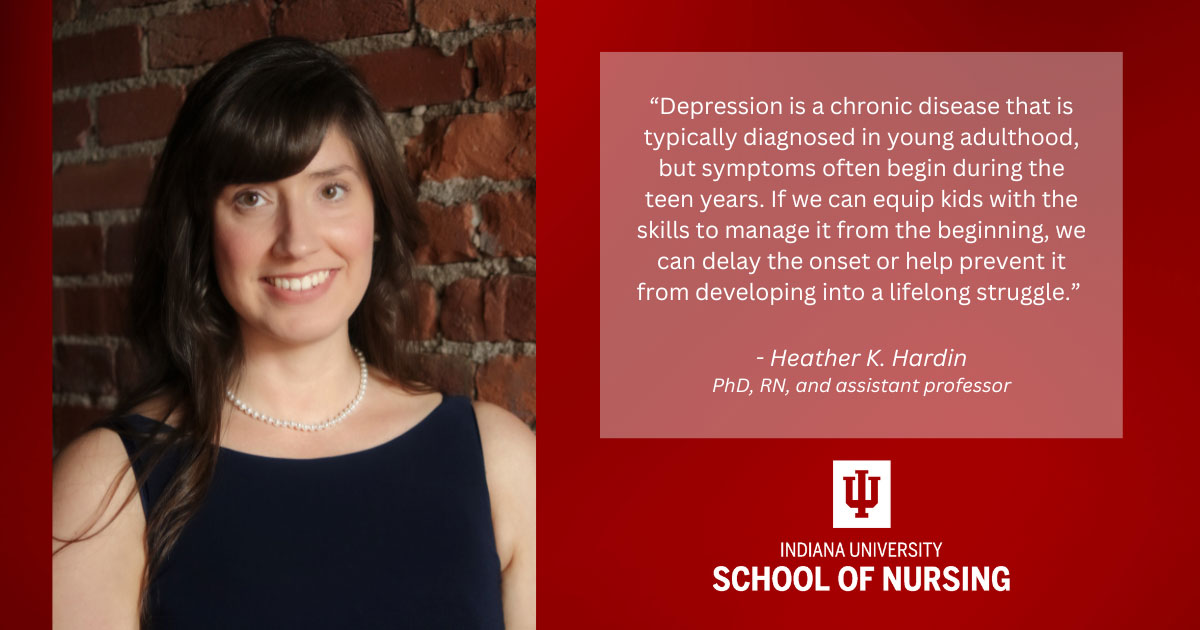Dr. Heather K. Hardin, PhD, RN, is an assistant professor at the Indiana University School of Nursing whose research focuses on chronic disease self-management, with a special emphasis on adolescent depression. Her most recent work, however, takes a bold step toward addressing the growing mental health crisis among youth, focusing on the prevention of depression in adolescents before it becomes a chronic condition.
Dr. Hardin’s research centers around a novel intervention she developed called Level Up designed for youth aged 11-13 with mild depressive symptoms. This program is based on the individual and family self-management theory and emphasizes the critical role of collaboration between youth and their parents in managing mental health. Dr. Hardin has spent years refining this approach, driven by her desire to make an impact on early intervention for mental health in youth.
"We first worked with teens and their parents. The feedback I got from both groups was that they loved the program," Dr. Hardin says. "But the teens told me, ‘I really wish I'd had this as a preteen.’ It was that feedback that pushed me to focus my next study on younger adolescents."
Dr. Hardin’s previous studies have laid the groundwork for this program. Originally, her work focused on youth obesity. She led a pilot study funded by a National Institute of Nursing Research (NINR)-supported research center at the Francis Payne Bolton School of Nursing at Case Western Research University that aimed to begin development of an adolescent weight management intervention. However, Dr. Hardin consistently heard from parents and adolescents that their stress levels and mood were of even greater concern than obesity alone. Realizing the critical link between mental health and chronic disease, she sought to explore this connection further.
As a co-investigator on the National Heart, Blood, and Lung Institute-funded Ideas Moving Parents & Adolescents to Change Together (IMPACT) study at the Francis Payne Bolton School of Nursing at Case Western Research University, she contributed to large-scale research on adolescent obesity. Recalling the comments from parents concerned about youth mental health, Dr. Hardin sought to further explore depression in youth. With this work, she led a team of interdisciplinary researchers that conducted a secondary analysis of the IMPACT trial that showed that nearly half of youth with obesity also had clinically significant levels of depressive symptoms.
This led her to conduct a pilot study funded by a National Institute of Minority Health and Health Disparities (NIMHD)-supported research center at the School of Medicine at Case Western Reserve University and the MetroHealth System in Cleveland, Ohio, where she developed an intervention that included mindfulness and sleep training for teenagers diagnosed with depression. The success of this study inspired Dr. Hardin to push her research further upstream—towards preventing depression before it fully takes hold.
Her innovative Level Up program teaches strategies for youth and parent collaboration and incorporates two evidence-based components: mindfulness and sleep.
"One of the things that really stood out was that kids needed help with sleep," Dr. Hardin explained. "Many adolescents stay up all night texting their friends or playing video games, and parents struggle to limit their access. But what they really needed was for the kids to buy into the importance of sleep."
The idea of getting buy-in from the youth themselves is a central tenet of Dr. Hardin’s work. She believes that empowering youth to value their mental health early on is key to preventing long-term mental health issues.
"Depression is a chronic disease that is typically diagnosed in young adulthood, but symptoms often begin during the teen years," she noted. "If we can equip kids with the skills to manage it from the beginning, we can delay the onset or help prevent it from developing into a lifelong struggle."
One of the unique aspects of Level Up is its community-based participatory approach, which actively engaged both parents and youth in the development of the intervention and recruitment methods. Dr. Hardin’s team attends community events, and even speaks at sports games and back-to-school events to engage families and recruit participants.
"Mental health is a sensitive topic, and parents and youth often want to meet our team before they commit," Dr. Hardin said. "We’ve found that these community connections are key to building trust and engagement."
The impact of her work is becoming increasingly urgent. Rates of clinically significant depressive symptoms in youth have skyrocketed in recent years, rising from 12% to more than 40% during the COVID-19 pandemic.
"This is not just a normal part of adolescence," Dr. Hardin said. "It’s a public health crisis that demands early intervention."
Looking ahead, Dr. Hardin plans to continue refining Level Up and expanding its reach. Recently, the Center for Enhancing Quality of Life in Chronic Conditions (CEQL) at the Indiana University School of Nursing awarded her funding to examine the feasibility of offering Level Up to youth ages 11-13 years. Her long-term goal is to offer the intervention on a broader scale.
"If we can prevent mild depressive symptoms from progressing into clinical depression," she explained, "we can make a significant difference in the lives of these young people."
Dr. Hardin’s work reflects her deep commitment to health promotion and disease prevention, rooted in her early experiences as a nurse.
"Adolescence is a time of rapid brain growth, making it the perfect time to develop lifelong habits that promote health," she said. Her research promises to move the field of adolescent mental health forward, offering hope for a future where early intervention can prevent the onset of chronic mental health conditions.


